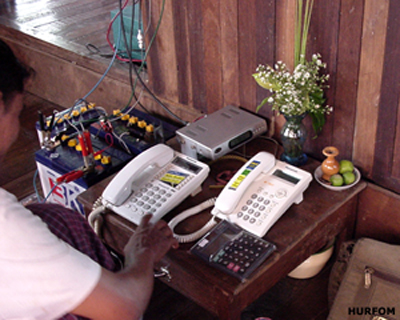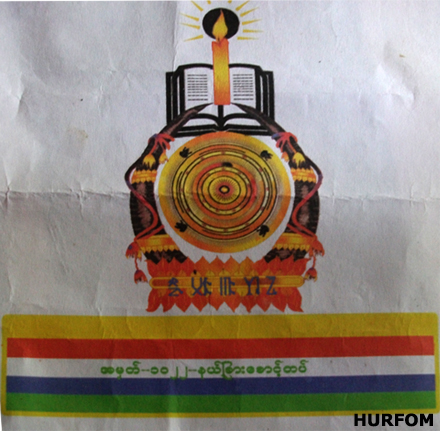Arbitrary taxation in Pa’an Township burdens phone operators to near breaking point
February 1, 2011
HURFOM, Pa’an: While fighting continues in Pa’an District, operators of phone services have been experiencing extensive arbitrary taxation by the government run BGF battalions, SPDC forces, and splinter DKBA units. This taxation has been so sever that phone operators are nearly unable to operate their businesses. As a result these sources of local communication and money transfers are closing down, denying local communities access to communication and a much-needed source of remittance payment from Thailand.
On January 21st, 2011, a Border Guard Force (BGF) unit, possibly Battalion No. 1022, visited residents in at least three villages collecting ‘taxes’ on the operation of phone transceiver and receiver units[1]. Col. Taw Ka Na, who operates the battalion in question, issued the order for tax collection from phone operators in the area. A HURFOM field researcher has only been able to confirm the names of thee arbitrary taxation victims in three villages[2]. However, the researcher has spoken with other victims of the tax, but only under the condition of anonymity. In these villages where arbitrary taxation cases have been confirmed, at least 3 phone service centers operate per village.
In this instance of taxation, 35,000 kyat was taken from telephone transceiver unit operators, and 10,000 kyat was taken from wireless handset owners, who receive calls routed through a local transceiver unit.[3] Operating within close proximity to the Thai-Burma border allows these transceivers services to operate off of signals from Thai service providers.
Since November 8th, when fighting erupted between the splinter DKBA Brigade No. 5, and Burmese army forces, significant tension and continued violence have undermined phone operating businesses. Phone operators report that, prior to fighting, taxation was carried out with consistency – only once a month – by DKBA units. After November 8th, phone services operated by family or members of the DKBA, were shut down. Non-DKBA phone transmitter operators remained open, but the influx of pro-government BGF forces has wiped out the system of monthly tax collection. As a result frequent arbitrary visits could cost a transceiver or phone owner 105,0000 or 30,000 kyat a month, respectively.
According to a transceiver unit operator located in Pa’an, Col. Taw Ka Na, who himself accompanied the collection units, insisted that the tax had to be paid on the spot or in the same day. He describes how the BGF battalions, as well as units from the Democratic Karen Buddhist Army (DKBA) and the Burmese army, come and take arbitrary taxes with no order or reference to the fact that a phone operator has already paid:
They come to collect the taxes 2 to 3 times in one month. Any group in the BGF [will] come to collect and each of them come to gather whenever they want to. Even though they’ve already collected [a tax], they forget to write is down on the list and we cannot complain to them [that] we’ve already paid them. Then, it [the BGF] is not the only group that comes to tax us…; the Burmese army and the DKBA come to charge us for phone service taxes. We can’t say anything, but taxing us like this is like we owe them [this money]. They also know that running the phone service does not mean that we earn a lot of money…Only families [with children] who are working in Thailand and want to talk to their children … use this phone service. Plus, we provided money transfers. That’s all. Because they come to collect taxes often, we do not earn a lot from the phone service. We have to use our money to pay the taxes.

A transceiver and phone system, widely used for calls in rural Burma, is seen in in Kawkareit Township, in 2010.
A Karen national, who preferred to remain anonymous, lives in Pa’an and pays phone service taxes to more than one group. Here she describes the difficulty of trying to operate her business under frequent instances of arbitrary taxation:
It is not specified as a monthly tax or yearly tax. They just come to tax [us] whenever they want to. There are 2 to 3 people in one group [that] comes to tax [us]. But not just one group comes to tax, there are also some other groups come to gather the taxes. Because of this, in this region numerous phone service owners have quit running phone services, as they cannot afford to pay the taxes. Because the authorities and armed groups are taxing us, what we’ve saved from working becomes empty. Nothing is left for us. They never accept what we request of them. What they said is that if you cannot pay the taxes, do not set up this phone service. But why do they say that [let us] set up this phone service? As they keep taxing us like [it’s a] long-term tax, it affects us. We are still thinking about stopping running this phone service.
The arbitrary frequency with which BGF, Burmese, and DKBA forces now extract this tax is destructive for phone operators and subsequently communities dependent on their services. As a result of this taxation transceiver and phone operators are unable to turn a profit, and have in cases, been forced to pay for these arbitrary taxes out of pocket. As noted above, with such steep prices of taxation, phone operators are increasingly unable to keep their service going.
This impact has potential for sever repercussions as the closure of phone services will likely undermine the livelihoods of local residents who are dependent on the inflow of remittance payments from migrant workers in Thailand, through the frequently uses a hundi system[4]. Phone owners, who distribute equivalent payments from baht to kyat, must receive phone calls in order to pass the money onto the recipient family. With an estimated 96 percent of payments from family members abroad being used to cover survival level costs of family in Burma, the delay cause by the absence of local phones could threaten the survival of local residents[5].
[1] Three BGF battalions, each fielding 326 soldiers and 30 officers, now operate in the area. All three units are under Southeast Command based out of Moulmein, and were formed after August 10th in 2010.
[2] For these, and other details of victims of arbitrary phone operation taxation, please contact HURFOM directly.
[3] Transceivers are distance radio transmitters and receivers. A transceiver unit, using a short antenna, can receive incoming phone calls and direct the call to a wireless phone units.
[4] ‘Hundi’ refers to the most widely used system in Burma of informally transferring money from a migrant worker back home. In a hundi system a migrant worker contacts a broker with a certain amount to send home. That broker contacts a counter part in Burma by phone, and authorizes an equivalent payment in kyat to the recipient family. Families then come to the Burma based counter part to receive the money.
[5] For further reading on these details regarding hundi systems and remittance payments please see, Sean Turnell, Alison Vicary and Wylie Bradford. “Migrant Worker Remittances and Burma: An Economic Analysis of Survey Results,” Macquarie University, Sydney, Australia, 2008. [SURVEYS 2]
Comments
Got something to say?
You must be logged in to post a comment.




















































